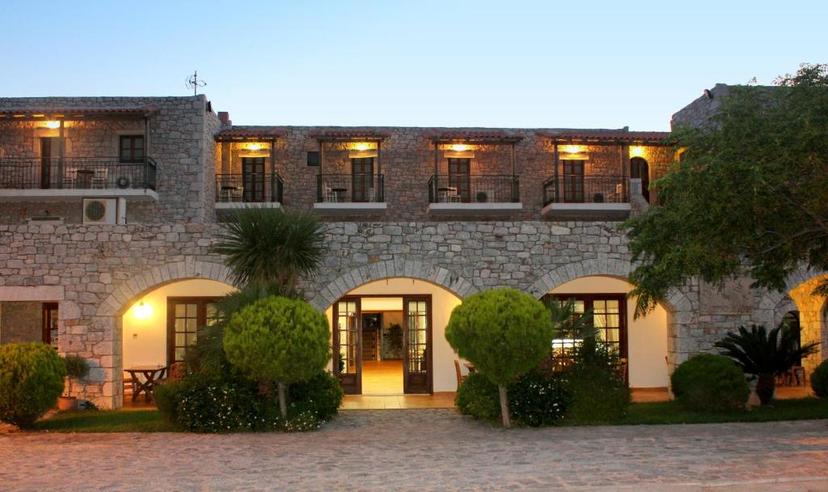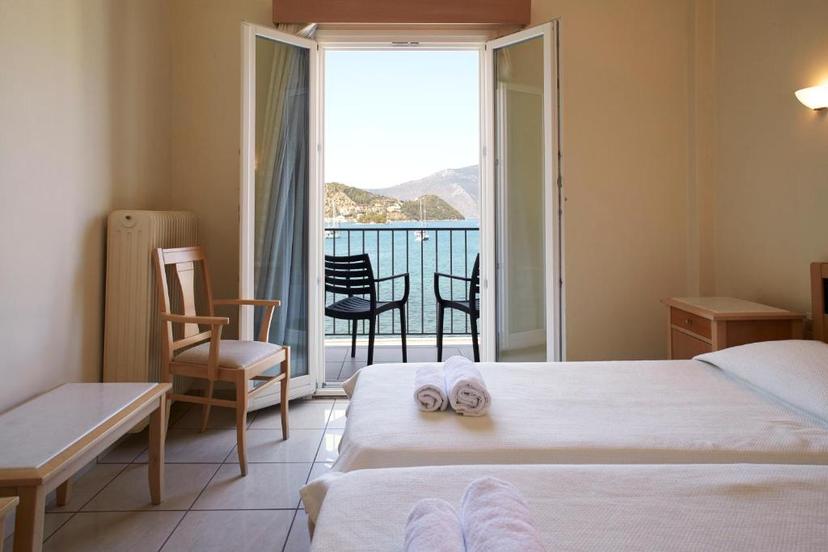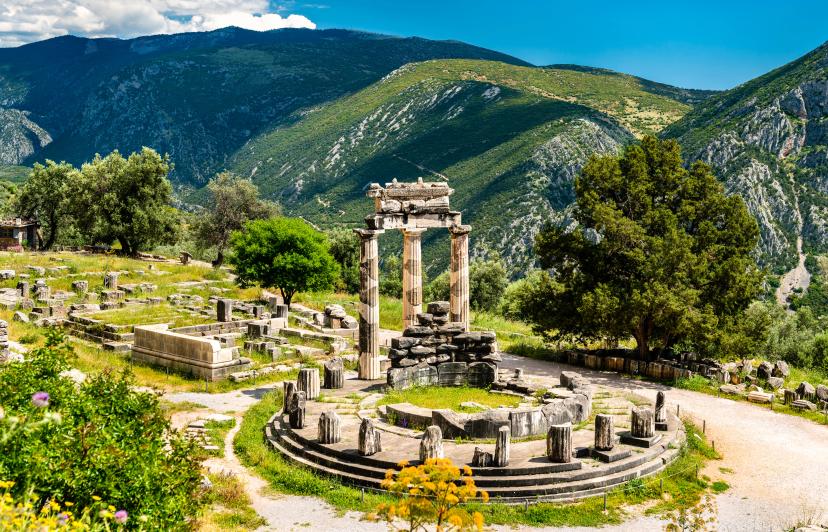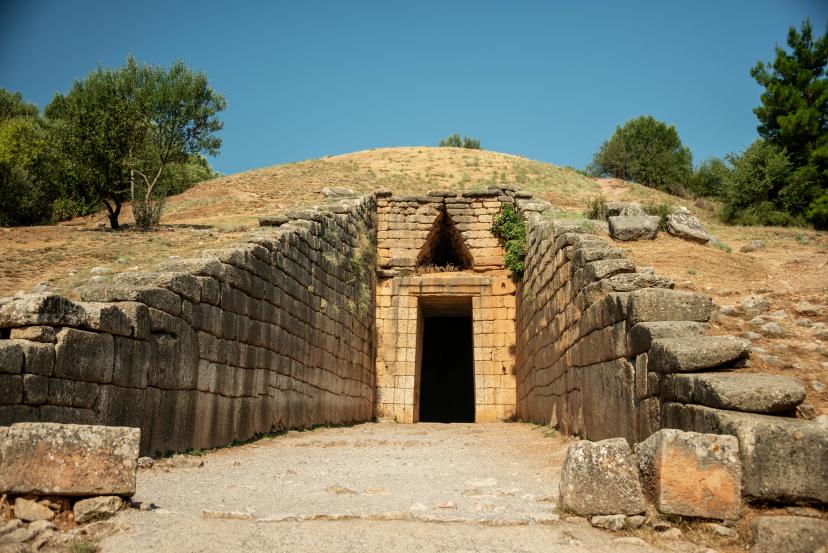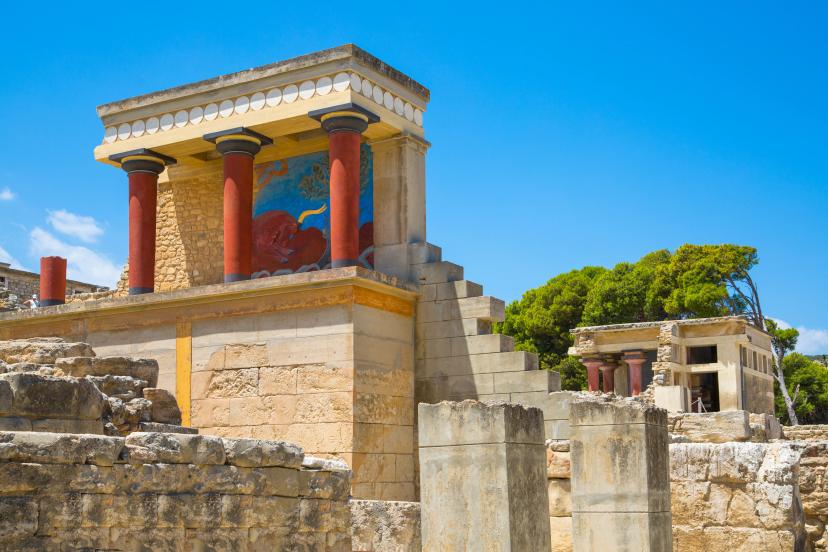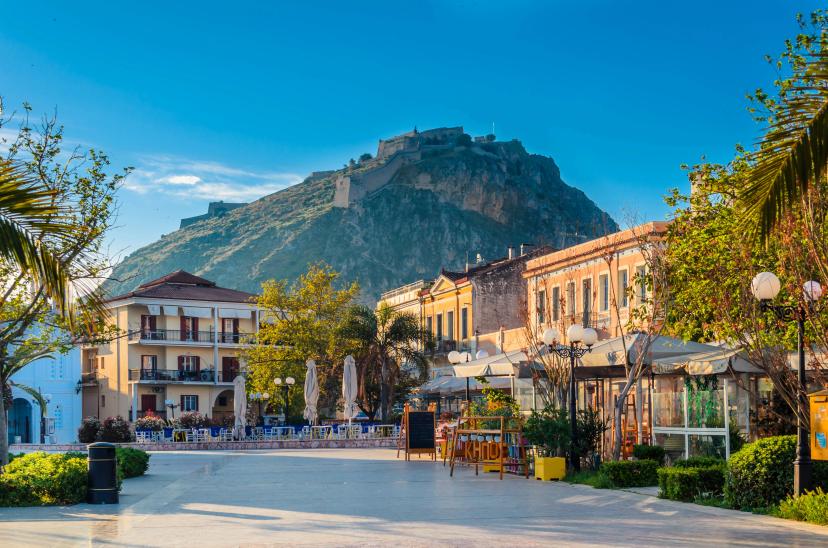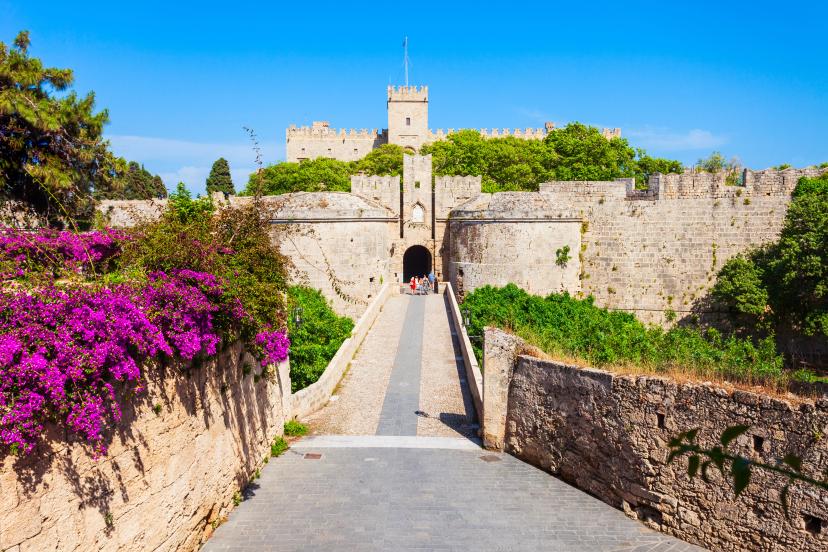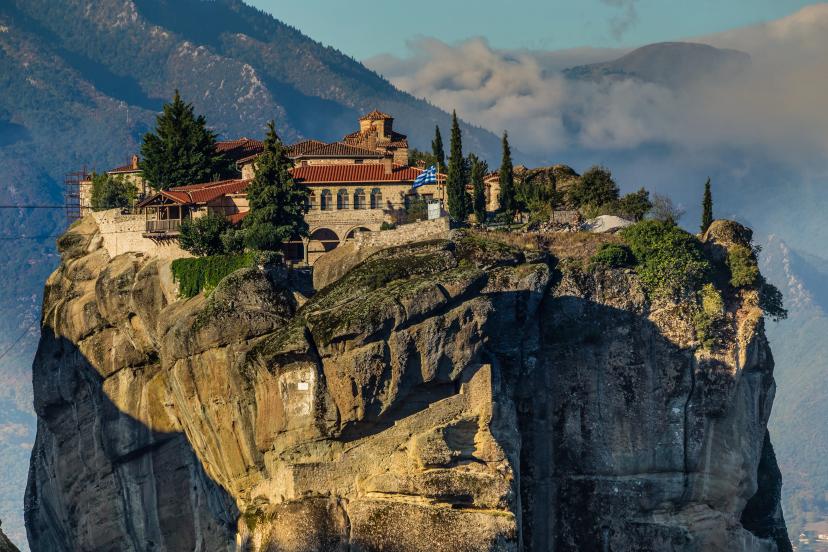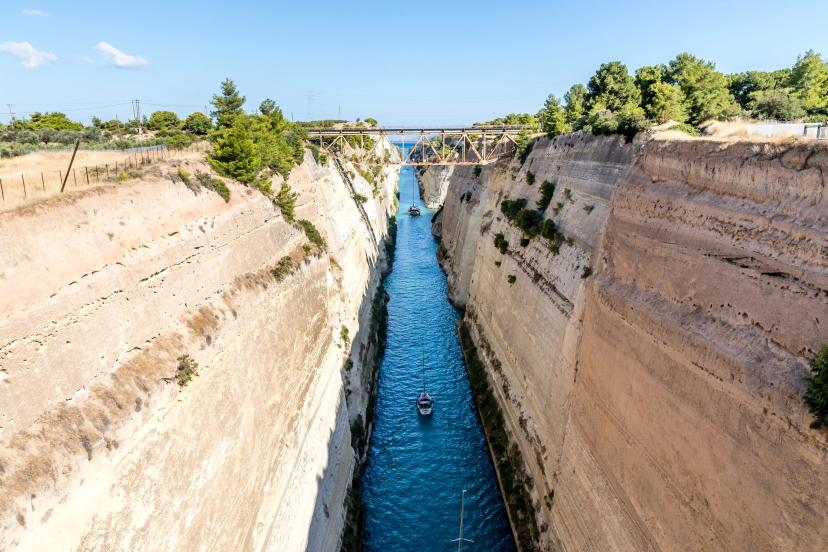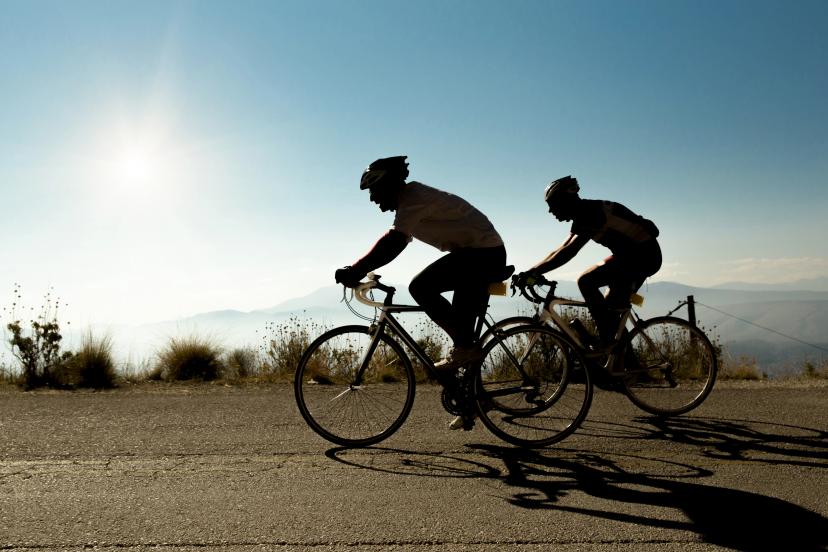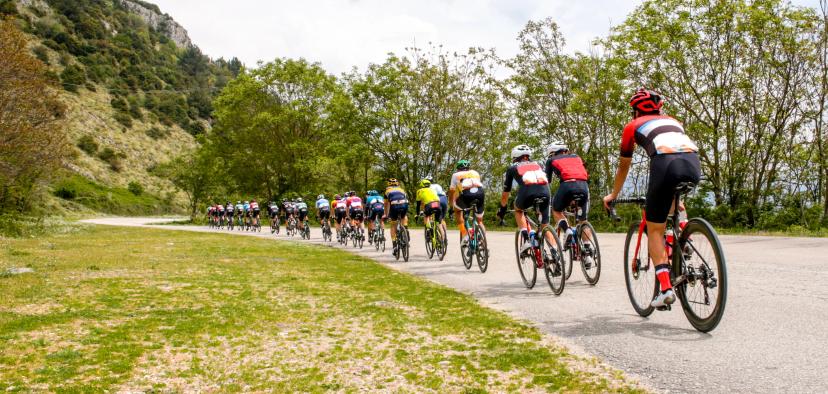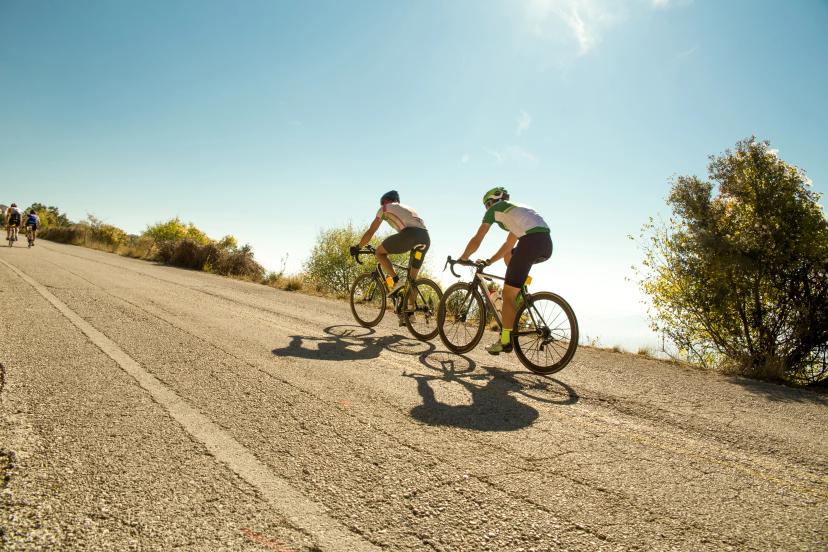The Ultimate Cycling Guide: The Top 4 Routes of Greece
Discover everything you need to plan the perfect cycling holiday in Greece — from seasons and routes to must-see places, history, and local culture.

Quick links
Did you know Greece has over 6,000 islands and islets, more than 16,000 kilometers of coastline, and a network of mountain and coastal roads that link ancient history with endless sea views?
With its mild climate, open landscapes, and island-to-island connections, cycling in Greece is one of Europe’s most rewarding ways to explore the Mediterranean.

This ultimate guide will walk you through everything you need to plan your Greek cycling adventure, including:
Cultural tips, cuisine, and local wines
And much more…
Why Cycle in Greece?
Greece is one of Europe’s most captivating destinations for a cycling holiday. From winding island roads overlooking the Aegean to quiet mountain valleys dotted with olive groves, the country combines natural variety with an unmatched sense of history. Cycling in Greece means discovering a landscape where ancient temples, seafront villages, and rugged hills coexist within a few kilometers.

This balance of scenery, culture, and easygoing Mediterranean pace makes Greece ideal for both casual riders and adventurous cyclists seeking something different.
What Makes It a Perfect Cycling Destination?
Diverse landscapes – Islands, coastlines, and mountains all within easy reach
Extended cycling season – Mild weather from March through November across most regions
Cultural depth – Ancient ruins, Byzantine monasteries, and traditional mountain villages
Island connections – Ferries and yachts linking rides across Cyclades and Ionian routes
Authentic hospitality – Family-run hotels and tavernas welcoming cyclists everywhere
Mediterranean cuisine – Fresh local food and wines like Assyrtiko and Agiorgitiko
Accessible logistics – Luggage transfers, e-bikes, and organized routes simplify travel
Calm and safety – Low traffic outside cities and a relaxed approach to cycling

Find more insights and route ideas in our guide of the best cycling routes of Greece.
When to Cycle in Greece
Greece has one of Europe’s longest riding seasons, stretching from early spring to late autumn. Knowing when to go—whether to the islands or the mainland—can make all the difference to your cycling experience.
Seasonal Breakdown:
Spring and autumn: The ideal windows for cycling Greece, with 18–28 °C days, light winds, and vivid landscapes. Roads are quiet, ferries run frequently, and conditions are perfect across both islands and inland routes.
Summer: Expect heat and dry air, especially inland. Best for coastal and island rides where sea breezes keep temperatures manageable. Early starts and shaded breaks are key.
Winter: The off-season for most regions, but southern Crete and the Peloponnese still offer mild days for short rides and scenic exploration.

For a detailed overview, see our month-by-month weather breakdown of Greece.
The Best Cycling Routes of Greece
From quiet island roads to mountain passes overlooking the sea, Greece’s cycling routes combine natural drama, cultural depth, and everyday Mediterranean life. Whether crossing the Peloponnese or hopping between islands, each region offers its own rhythm and rewards.

1. Cyclades Islands
A journey through whitewashed villages, volcanic ridges, and endless sea views, the Cyclades bring together classic island charm and gentle adventure. Rides alternate between relaxed coastal paths and scenic climbs, with ferries linking each stage into a seamless route across the Aegean.
Experience the Aegean’s essence on this Greek cycling tour:
See more about Greece's best cycling regions and routes in our guide here.
2. Ionian Islands
Emerald hills, olive groves, and Venetian-era harbors define the Ionian Islands — Greece’s most tranquil cycling region. Riders trace coastal roads past turquoise bays, cross between islands by ferry, and enjoy soft gradients paired with Mediterranean ease. Find out what makes the Ionian so special in our dedicated guide.
Discover lush landscapes and layered history on the following route:
3. Peloponnese Heartlands
The Peloponnese delivers Greece at its most storied — Spartan plains, Byzantine fortresses, and the wild ridges of the Mani Peninsula. The terrain mixes challenge and reward, blending history with authentic local life in every town and valley.
Cycle through living legends and mountain grandeur on our tour:
Curious to find out more about cycling in the Peloponnese? Visit our Peloponnese guide.
4. Crete – The Island of Extremes
Crete offers a world within one island: rugged mountains, serene plateaus, and coastlines brushed by Libyan winds. The routes climb through gorges and descend toward timeless villages where mythology still feels near.
Ride from sea to summit on this tour:
Find out more about Crete here.
Bike-Friendly Hotels in Greece
Comfort and convenience matter as much as the ride itself. All hotels featured along our routes are bike-friendly, offering secure storage, easy access, and services tailored to cyclists — from early breakfasts to quick laundry options. Whether overlooking the sea or nestled in a mountain village, each property reflects the region’s character and hospitality.

What’s Included in Our Greece Bike Tours?
When you book one of our Greek cycling holidays, we handle every part of your accommodation planning, so you can focus entirely on the ride. Comfort, reliability, and cyclist-friendly details are built into every itinerary — no guesswork required.
What you can expect across all our tours:
Comfortable 3★ hotels or well-rated guesthouses
Daily breakfast included
Secure, cyclist-friendly storage or ground-level access
Free Wi-Fi in all standard properties
Optional upgrades to boutique, spa, or design hotels
What Kind of Bike-Friendly Accommodation is Available in Greece?
If you have any special requirements — such as upgraded rooms, spa access, or personalized transfer arrangements — simply contact us, and our team will make the necessary arrangements.
A Rising Cycling Culture
While Greece has long been known for sailing, hiking, and archaeology, cycling is quickly becoming part of its travel identity. Over the past decade, regional authorities and private initiatives have expanded bike-friendly infrastructure, particularly in areas like Crete, Attica, and the Peloponnese.

New coastal bike lanes, improved signage, and well-paved island roads now make it easier than ever to explore both urban and rural landscapes on two wheels. Local governments are also promoting cycling as a sustainable, low-impact way to experience the country’s culture and nature — aligning perfectly with Greece’s growing “slow travel” movement.
Good to Know
E-bike rentals are available on request on all our tours, offering extra comfort on hilly terrain or longer routes
Support vehicles and GPS navigation are included in most itineraries, ensuring smooth self-guided travel
Domestic flights and ferries connect major cycling regions, from the Ionian to the Aegean, allowing flexible route combinations
Cycle-friendly lodging and luggage transfers are standard across our tours, keeping the focus on the ride itself
Cycling in Greece is increasingly community-driven — from small island cooperatives maintaining rural trails to local cafés welcoming touring riders year-round

Cycling here isn’t just about covering distance — it’s about embracing the Greek rhythm: relaxed, scenic, and deeply connected to place.
Best Places to See in Greece
Cycling in Greece means tracing more than 4,000 years of continuous civilization. Ancient temples, Byzantine monasteries, and Venetian harbors line today’s cycling routes — blending active travel with living heritage. From mountain fortresses to island villages, every region tells a story shaped by myth, empire, and the modern Mediterranean.
Our tours are designed to bring you close to these treasures, combining cultural depth, coastal scenery, and timeless Mediterranean life. Ride past amphitheatres, monasteries, and seaside fortresses perched above olive groves or the Aegean — where history is never far from the road.
Some Cultural Highlights:
Get inspired with more landmarks, UNESCO sites, and hidden gems featured along our Greek cycling routes. Here’s the extended list of must-see places in Greece, featured in our tours.
See The Best of Cycling Races in Greece
Whether you’re a fan of professional road racing or just curious to ride in the tracks of the pros, Greece hosts a growing number of cycling events that showcase its mountain routes, coastal roads, and historic towns. From elite UCI races to open community challenges, these events add a thrilling dimension to any cycling trip.
Make It Part of Your Journey
If you’d like to see these races up close or even participate, plan a call with us — we can align your travel dates, arrange logistics, and tailor your itinerary around these events. Whether cheering from the roadside or crossing the finish line yourself, we’ll make sure your Greek cycling experience becomes truly unforgettable!

How Many Days for a Cycling Trip?
The ideal duration for a cycling holiday in Greece is 7 to 9 days — long enough to experience the islands, mountains, and coastlines at a relaxed Mediterranean pace. This time frame offers a perfect balance between activity, discovery, and downtime by the sea.
All of our tours are designed around this rhythm, ensuring riders enjoy immersive days on the road and restful evenings in charming local stays.

Plan For 7–9 Days, Then Add More
A week to nine days lets you explore our world-class cycling routes, with time left for swims, vineyard visits, or evening strolls through old harbor towns. You’ll cover plenty of distance without ever feeling rushed — the Greek way to travel.
If your schedule allows, extending your trip before, after, or even during the tour is an excellent way to deepen the experience.
Take the Ultimate Crete Cycling Challenge, for instance. We often recommend adding a couple of days in Heraklion or Chania before starting — both cities brim with Minoan history, markets, and seafront cafés that set the tone for the ride ahead. Cycling into Crete’s mountains is unforgettable, but exploring its coast at leisure completes the story.

Your Cycling Tour Is Just The Start
No matter which Greek route you choose, there’s always more to discover — quiet beaches, archaeological sites, and small villages where time slows down. If you have the flexibility, we encourage you to extend your journey beyond the saddle. Our team can help you:
Add pre-tour city stays in Athens or Heraklion
Plan post-tour rest days on the islands or coast
Include active add-ons like hiking, kayaking, or wine tasting

Just let us know about your interests, and we’ll tailor the perfect extended experience around your Greece cycling tour.
What to Pack?
Packing for a cycling holiday in Greece is easy once you know what to expect. The climate is typically warm and dry, but conditions can change between sunny coasts, breezy islands, and cooler mountain routes — so versatile gear makes all the difference.
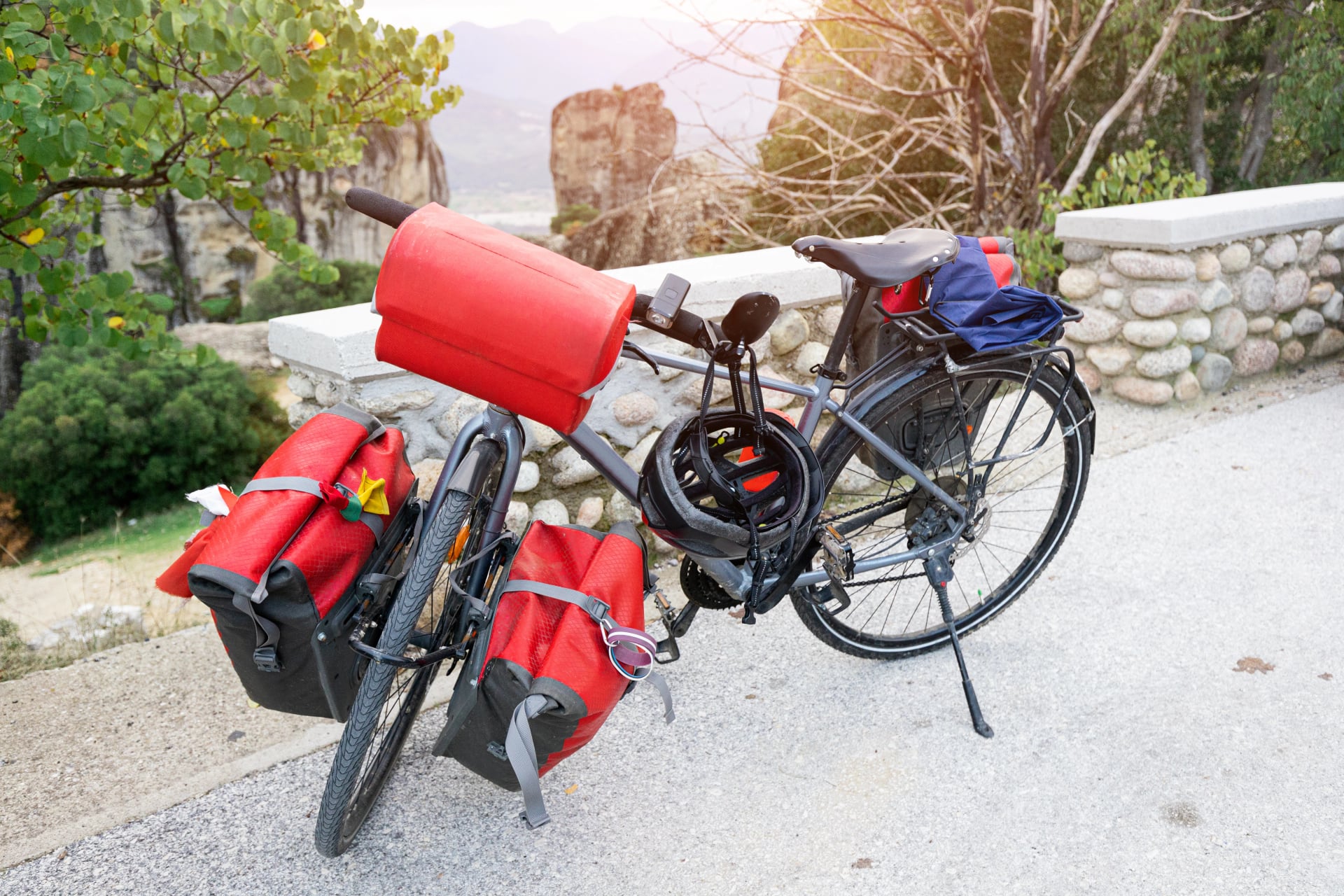
When you book, you’ll receive our digital guidebook with a tailored packing checklist based on your route, season, and tour length.
Essentials to Bring
Passport – valid for at least three months beyond your trip
Cycling kit – jerseys, padded shorts, gloves, and a light jacket for wind or occasional showers
Casual wear – for dinners or relaxed evenings after the ride
Swimwear – ideal for post-ride dips in the sea or hotel pools
Comfortable walking shoes – or sandals for sightseeing and short strolls
Helmet – included with our rentals, though you’re welcome to bring your own
Phone + charger + EU plug adapter (Type C or F)
Power bank – useful on long days with GPS navigation
Sunglasses and sunscreen – Mediterranean light can be strong, even in spring and autumn
Reusable water bottle – tap water in Greece is safe in most areas
Money – credit/debit cards plus some euros for cafés and small village shops
Local SIM or eSIM – easy to arrange on arrival for reliable data access
Save time, pack light — and rely on our cyclist-approved checklist included in your guidebook.

Nice-to-Have Extras
Small camera or action cam to capture island views and coastal descents
Light backpack for snacks and essentials during daily rides
Arm/leg warmers for early mornings in the mountains
Compact first-aid kit for small scrapes or blisters
Travel-size detergent for washing cycling clothes on longer tours
With the essentials sorted and luggage transfers handled, all that’s left is to enjoy the ride — Greece takes care of the rest.

Cycling Rules & Road Etiquette in Greece
Knowing the local rules is key to enjoying a smooth and safe cycling trip in Greece. Bicycles are recognized as vehicles under Greek law, and riders are expected to follow the same traffic standards as cars. The good news? Greece’s expanding network of bike lanes, rural roads, and island routes makes cycling straightforward once you’re familiar with a few essentials.

General Cycling Rules
Bicycles may use public roads, marked cycle paths, and shared lanes.
Motorways (autokinitodromos) are strictly prohibited for cyclists.
Standard traffic laws apply: keep to the right-hand side, obey all traffic lights and signs, and yield to pedestrians at crossings.
Riding Formation & Signals
Riding two abreast is allowed when it doesn’t obstruct traffic; switch to single file on narrow or busy roads.
Use clear hand signals when turning, stopping, or changing lanes.
Always stop at red lights and stop signs — pedestrians have priority at all times.

Sidewalk Cycling & Shared Zones
Sidewalks are generally off-limits to bicycles unless marked as shared routes.
Children under 10 years old may cycle on sidewalks where no bike lane exists.
In shared pedestrian zones, move slowly and give way — especially in historic centers or waterfront promenades.
Helmets & Visibility
Helmets are mandatory for children under 12, and strongly recommended for everyone.
After dark or in low visibility, bikes must have a white front light and red rear light; reflective vests or accessories are encouraged, especially on rural roads. But don’t worry, this will already be sorted for you with our partners at the bike rental.

Phones, Audio & Distractions
Using a handheld phone while riding is prohibited.
Headphones or earbuds that block outside sound are also discouraged and may lead to fines.
Some of our rental bikes come with phone holders, so GPS navigation remains hands-free and safe.
Greek drivers are generally courteous toward cyclists, especially in quieter regions and on islands, but caution is advised on winding coastal roads and mountain descents. Staying visible and predictable is the key to an enjoyable ride.
Alcohol & Safety Awareness
The legal blood-alcohol limit for cyclists in Greece is 0.5‰, similar to most EU countries. While local wine and beer are tempting, save tastings for after the ride. Even small amounts of alcohol can impair judgment on narrow or winding roads, so leave the wine tasting till after the main ride.
Greek drivers are generally courteous toward cyclists, but extra care is advised on mountain descents, coastal roads, and urban traffic.
Courtesy on the Road
A friendly wave or nod to drivers who give space is always appreciated — it reflects Greece’s respectful and hospitable road culture.
Ride single file on narrow roads, or two abreast only when it’s safe and non-obstructive.
In historic centers, expect cobbled streets and pedestrian traffic; slow down and share the space calmly.
Navigating Greek Culture for Cyclists
Cycling in Greece isn’t just about the scenery — it’s about immersing yourself in a culture shaped by sunlight, conversation, and centuries of tradition. Every ride offers a glimpse into the country’s rhythm of life: slow mornings, long meals, and timeless hospitality. Knowing a few cultural details will make your Greek cycling trip even more rewarding.
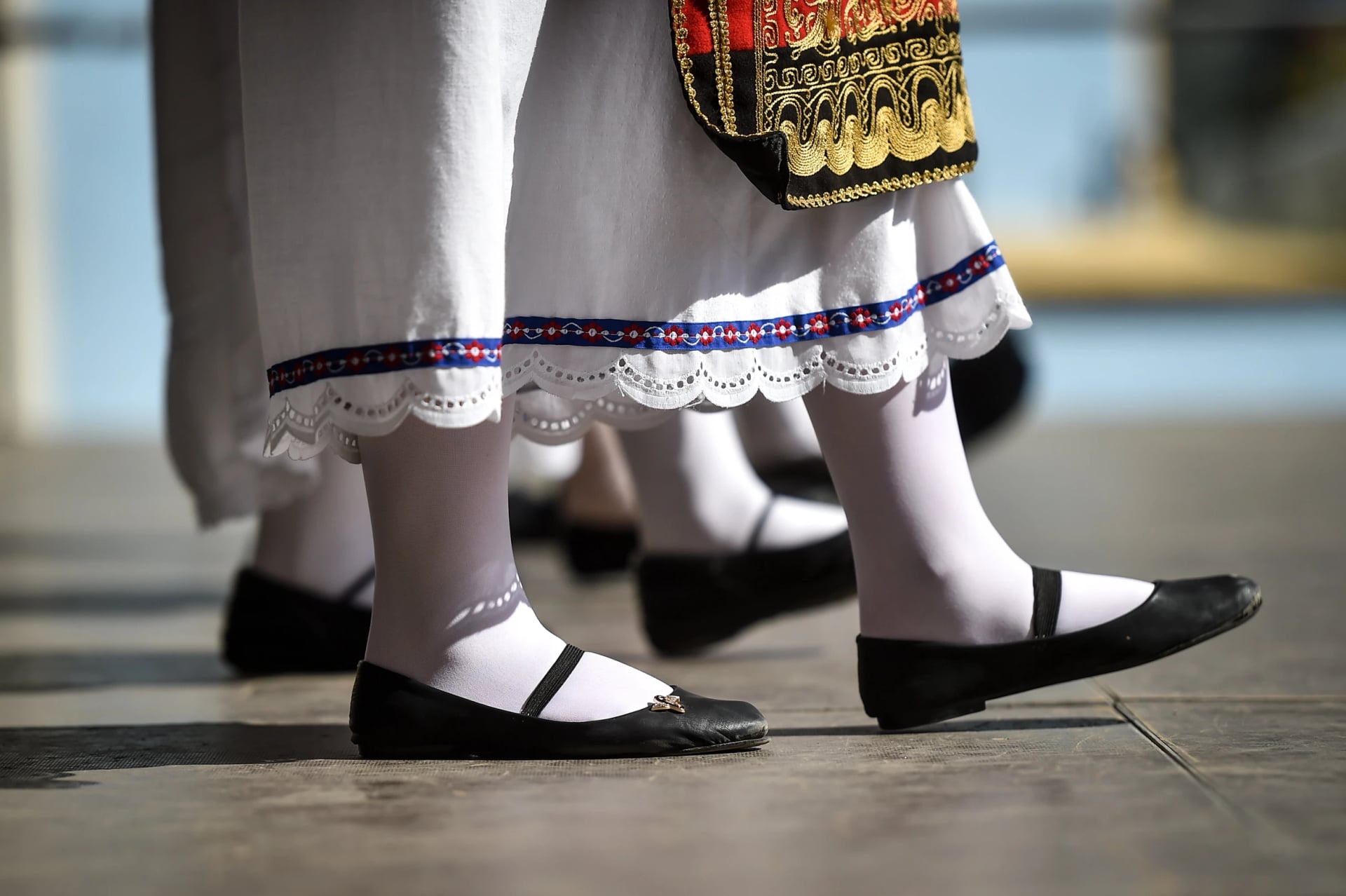
Embrace the Greek Pace – Time Flows Differently
Greece moves at its own tempo — unhurried and human. Lunch is usually served between 1:00 and 3:00 PM, and dinner rarely begins before 8:00 PM. Many shops and small businesses close in the afternoon heat, especially in summer, and Sundays remain quiet, with families gathering for long meals. If you’re cycling through rural areas, it’s best to plan meal stops ahead of time. The relaxed rhythm isn’t inefficiency — it’s part of Greece’s character.
Wine & Café Culture
Greece is one of the world’s oldest wine-producing regions, and you’ll pass vineyards in nearly every cycling area, from Nemea to Crete and Santorini. Sampling local wines — from crisp Assyrtiko to bold Agiorgitiko — is a highlight, though proper tastings are best saved for the evening.

In villages and island towns, cyclists often stop at local cafés for a strong Greek coffee or an iced frappe, joining locals who make the café their social hub. At nearly any hour, you’ll find groups of Greek grandpas and grandmas gathered around tables — sipping coffee, playing chess, or simply talking the day away.
Autumn rides bring grape harvests, open-air tavernas, and a convivial atmosphere where locals often invite you to share a glass.

Cuisine Worth Riding For
Greek food is both simple and deeply regional, built around olive oil, herbs, vegetables, and grilled meats or fish. After a day of cycling, dishes like moussaka, spanakopita, or fresh seafood offer a satisfying balance — hearty yet light. Meals are social, often shared among friends at open-air tavernas overlooking the sea or village squares. Food here isn’t just fuel — it’s part of the story of each region you ride through.

Culture on the Road
In Greece, culture spills effortlessly into daily life. You might pause your ride for a local festival, a religious procession, or even a herd of goats crossing a mountain pass. On the islands, village squares come alive at night with music and dancing, while mainland towns host traditional feasts and markets year-round.

These spontaneous encounters — a wave from a farmer, a roadside church bell, a café stop that turns into conversation — are what make cycling in Greece unforgettable.
Life on the Road: When the Locals Have Hooves
In Greece, the road itself can turn into a stage for everyday rural life. It’s not unusual for cyclists to pause mid-ride as a shepherd guides a flock of sheep across the asphalt or a group of mountain goats wanders down from the hills in search of shade.
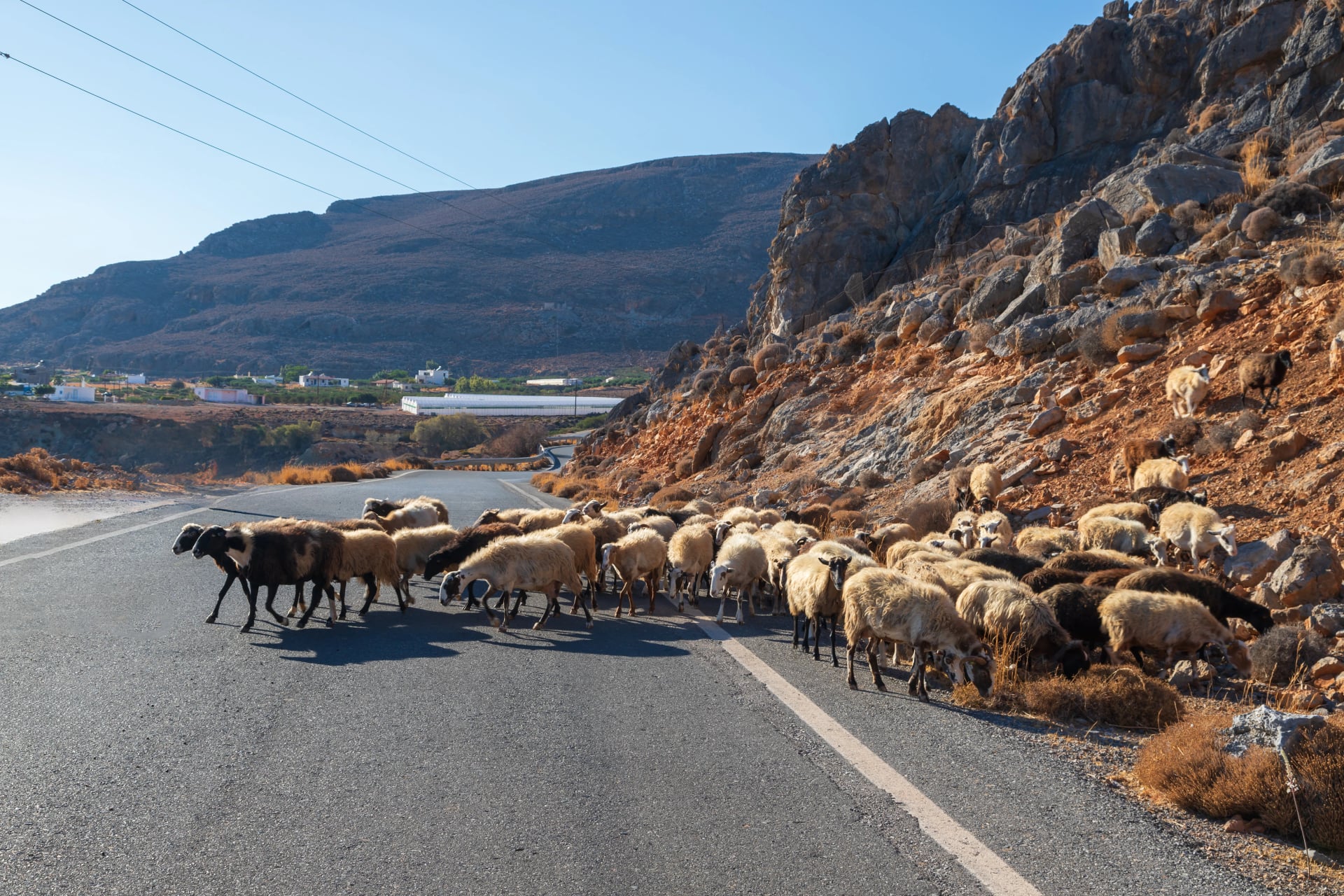
If you’re cycling through the Peloponnese or Crete, expect these encounters on quiet country lanes and mountain passes. Bells clinking, hooves clattering, and a shepherd’s whistle might briefly halt your climb—but that’s all part of the rhythm of rural Greece.
These spontaneous stops are part of the joy of cycling here—moments of stillness and authenticity that remind you the landscape isn’t just scenic, it’s alive.
Language Tips: Greek Basics
While English is widely spoken in Greece — especially in Athens, on the islands, and in most tourist areas — learning a few Greek words can make your trip far more engaging. Locals genuinely appreciate the effort, and even a simple greeting earns a warm smile.

Did you know that modern Greek has been spoken continuously for more than 3,000 years, making it one of the oldest living languages in the world? Or that efcharistó (thank you) shares its root with Eucharist, meaning “gratitude”? Greek is full of these small linguistic windows into its ancient past.
20 Useful Phrases:
Γειά σου (YAH-soo) – Hello
Καλημέρα (kah-lee-MEH-rah) – Good morning
Καλησπέρα (kah-lees-PEH-rah) – Good afternoon / Good evening
Καληνύχτα (kah-lee-NEEK-tah) – Good night
Αντίο (ah-DEE-oh) – Goodbye
Παρακαλώ (pah-rah-kah-LOH) – Please / You’re welcome
Ευχαριστώ (ef-ha-ree-STOH) – Thank you
Συγγνώμη (see-GHNO-mee) – Excuse me / Sorry
Μιλάτε αγγλικά; (mee-LAH-te angh-lee-KAH) – Do you speak English?
Δεν μιλάω ελληνικά (then mee-LAH-oh eh-lee-nee-KAH) – I don’t speak Greek
Μπορείτε να με βοηθήσετε; (boh-REE-te nah meh voi-THEE-se-te?) – Can you help me?
Πού είναι…; (poo EE-neh) – Where is…?
Πόσο κοστίζει; (POH-soh koh-STEE-zee?) – How much does it cost?
Τουαλέτα (too-ah-LEH-tah) – Bathroom / Toilet
Νερό (neh-ROH) – Water
Έχασα τον δρόμο μου (E-ha-sa ton THRO-mo moo) – I’m lost
Έχω λάστιχο (E-hoh LA-stee-ho) – I have a flat tire
Μπορείτε να με βοηθήσετε με το ποδήλατο; (boh-REE-te nah meh voi-THEE-se-te meh toh poh-THEE-lah-to?) – Can you help me with the bicycle?
Πού είναι το κατάστημα ποδηλάτων; (poo EE-neh toh kah-TAS-tee-ma poh-thee-LA-ton?) – Where is the bike shop?
Πεινάω / Διψάω (pee-NA-oh / thee-PSA-oh) – I’m hungry / thirsty
Χάρηκα πολύ (HA-ree-kah poh-LEE) – Nice to meet you
Learning a few local phrases shows respect — and it often opens doors to small moments of connection you’ll remember long after the ride.
Cats of Greece: Companions on Every Corner
In Greece, cats are part of the scenery as much as the ruins and sea views. They stretch across sun-warmed marble steps, weave through café terraces, and nap under fishermen’s boats. From Athens’ ancient alleys to the whitewashed lanes of the Cyclades, you’ll find them everywhere—curious, calm, and utterly at home.

On your rides, expect a few feline encounters. A tabby might sunbathe on a village doorstep in Naxos, or a trio of kittens might watch you pass through a mountain square in Crete. While they often seem friendly and relaxed, we don’t recommend touching or feeding them, as most are independent strays cared for by local communities.
It’s all part of the country’s charm—the cats of Greece aren’t just bystanders, they’re hosts, greeting travelers in their own unhurried, timeless way.
Travel Documents and Logistics
Visa and Entry Requirements
Most travelers visiting Greece for tourism can stay up to 90 days without a visa, including citizens of the United States, Canada, the United Kingdom, Australia, Japan, and most European countries.
Greece is part of the Schengen Area, meaning the 90-day limit applies across all Schengen states combined.
Check that your passport is valid for at least three months beyond your planned departure date — though six months is recommended for extra peace of mind.

What Is a Schengen Visa and Who Needs One?
The Schengen visa is a short-stay visa that allows travel within Greek and 25 other European countries that are part of the Schengen Agreement. It’s typically issued for tourism or business and is valid for stays up to 90 days within a 180-day period.
Travelers from countries outside the EU, UK, US, Canada, Australia, Japan, and several others usually require this visa. Applications are made through the Greek embassy or consulate in your country of residence, and processing times can vary—so plan ahead. Check your Greek visa requirements here.
Starting late 2026, visitors from visa-exempt countries will also need to apply online for ETIAS travel authorisation, valid for three years or until passport expiry. Read more about ETIAS here.
Major International Airports
Greece’s airports are well connected across Europe and beyond, offering easy access to all major cycling regions.

Athens International Airport (ATH) – The country’s main hub, ideal for mainland and Peloponnese cycling tours.
Heraklion Airport (HER) – Perfect for routes in Crete, including the Ultimate Crete Cycling Challenge.
Thessaloniki Airport (SKG) – Serves northern Greece and routes toward Macedonia and Chalkidiki.
Corfu Airport (CFU) – Best for the Ionian Islands Cycling Holidays.
Santorini Airport (JTR) – Gateway to the Cyclades, connecting easily with ferry routes for the Cyclades Bike & Boat Tour.
You can also bring your own bike to Greece or opt to rent through us — all our tours include bike delivery and setup at your first hotel.
Travelling via Public Transportation
Public transport in Greece is reliable and improving steadily, with easy links between major cities, ports, and islands.

Trains: Operated by Hellenic Train, connecting Athens with cities such as Thessaloniki, Larissa, and Patras. Bike transport is possible on most regional trains; pre-booking is recommended for long-distance routes.
Buses: The KTEL bus network reaches nearly every town and village. Bicycles can usually be transported in luggage compartments, depending on space.
Ferries: A key part of Greek travel. Ferries and high-speed catamarans connect the islands year-round, and most accept bicycles. Your digital guidebook includes full details on ticketing and schedules.
Urban Transport: Athens and Thessaloniki have metro and bus systems; trams operate along the Athenian Riviera. In cities, it’s often easiest to travel short distances by taxi or bike.
When traveling with us, your digital guidebook provides step-by-step directions to your starting point and clear ferry instructions. Our team can also arrange transfers if preferred.
Currency and Payments
Greece uses the Euro (€).

ATMs are common even in small towns.
Most restaurants, hotels, and shops accept credit and debit cards, though small cafés and rural tavernas often prefer cash.
Tipping is appreciated but not mandatory — leaving 5–10% for good service is standard.
Emergency Numbers and Safety
Greece is generally safe for cycling tourists around populated areas, with relatively low crime rates and a calm travel environment. Still, it’s good to be prepared for the unexpected — from a flat tire to a medical emergency.

Main emergency contacts:
General emergency (EU-wide): 112 – connects to police, fire, and medical services.
Police: 100
Ambulance: 166
Fire brigade: 199
Tourist Police: 1571 – available in major destinations for assistance in English.
When calling, clearly state:
The type of emergency (accident, injury, fire, etc.)
Your location (nearest town, road name, or GPS coordinates)
How many people are involved
Any hazards or traffic conditions
Your contact number

Emergency services in Greece are generally efficient and accustomed to helping international travelers. In rural or island areas, medical response may take longer — in these cases, local pharmacies are excellent first points of contact for minor injuries or advice. They will be marked in your GPX routes.
Our on-tour support line is also available at any time to help you coordinate local assistance or emergency logistics.
Mobile Reception & Connectivity in Greece
Greece offers strong mobile coverage across most mainland and island regions, with 4G available almost everywhere and 5G service expanding rapidly in Athens, Thessaloniki, Crete, and the Cyclades. Signal may fluctuate in remote mountain passes or on small islands, so downloading offline navigation maps before departure is recommended.

Main mobile operators:
Cosmote – the widest national coverage, including remote island routes
Vodafone Greece – reliable, especially in urban and coastal areas
Nova (formerly Wind) – affordable prepaid options for short stays
Prepaid SIM cards can be purchased at airports, convenience stores, and mobile shops. A €10–€20 card typically includes several GB of data with free EU roaming. Passport identification is usually required at the point of purchase.
eSIMs are also supported in Greece. Providers like Airalo, Holafly, and Nomad allow travelers to set up mobile data before arrival — ideal for instant connectivity on tour.
Free Wi-Fi is available in nearly all hotels, cafés, and public squares, with surprisingly good speeds in most tourist areas. Ferry terminals and larger vessels also offer Wi-Fi, though connections can be slower at sea.
For remote rides or multi-island routes, carrying a small power bank ensures your GPS and phone stay charged through the day.

We’re happy to assist with visa, airport, or flights questions as you prepare for your cycling holiday in Greece. Booking your stays, transfers, luggage transfers and bikes is on us, so you do not have to worry about it. Send us an email if you would like to know more!
As for your itinerary: everything — from navigation to ferry times — is detailed in your digital guidebook, so you can travel confidently and focus on the ride ahead. Just contact us if you have any questions.
What to Expect on a Self-Guided Cycling Holiday
Morning: Start the Day Smoothly
Your bike — whether a hybrid, e-bike, or gravel model — will be delivered directly to your first hotel, fully adjusted and ready for the journey ahead. A helmet and panniers are included, so you’re equipped from day one.

Breakfast (included in your stays) is typically served between 7:00 and 9:30 AM, featuring local bread, olives, yogurt, fruit, and strong Greek coffee. Most riders start early to take advantage of the cool morning air before the midday sun. This pace also leaves time for unhurried stops — a view over olive groves, a quick swim, or a photo break by a seaside chapel.
Midday: Ride, Pause, Discover
As you travel between overnight stops, your luggage is transferred for you and will be waiting at your next hotel on arrival — meaning you can ride light and focus purely on the experience.
Cycling holidays in Greece are designed for freedom and flexibility. You’re never tied to a fixed schedule — decide when to stop for a snack in a taverna, explore a quiet fishing port, or visit a historic monastery along the route.

Your GPX navigation and digital guidebook highlight scenic lookouts, local cafés, cultural landmarks, and swimming spots, so you’ll always know the best places to pause.
Each day offers a new combination of riding, discovery, and immersion — from ancient ruins to blue bays and lively village squares.
Afternoon & Evening: Time to Unwind
By mid-to-late afternoon, you’ll arrive at your next hotel, where your luggage is already waiting. Many properties feature terraces, pools, or shaded courtyards — ideal for unwinding after the day’s ride.
You’ll still have plenty of daylight to stroll the harbor, enjoy a glass of local wine, or simply watch the sun set over the Aegean or Ionian Sea. Dinner is always on your own schedule, giving you freedom to sample traditional dishes like grilled fish, gemista, or spanakopita wherever the atmosphere feels right.

Cycling days in Greece balance activity and leisure perfectly — ride by day, relax by the sea at night, and enjoy every moment in between.
Cycle Through Greece with Confidence
Booking a cycling holiday in Greece with us means every detail is taken care of. From scenic island routes to luggage transfers and navigation, you’ll have all the support you need to focus on the ride — and enjoy the journey at your own pace.
Included in every tour:
Daily luggage transfers between hotels so you can ride light
GPS navigation via an easy-to-use app with daily tracks designed around your route and preferences
Full organization of accommodations and ferry or land logistics
A digital guidebook with itinerary details, insider tips, and cultural highlights
On-tour support whenever you need assistance
E-bike rentals are available on request on all tours
Not sure which route suits you best? Book a consultation with us — we’ll help you choose the ideal Greece bike tour based on your fitness level, interests, and travel style.

Hassle-Free
We take care of route planning, accommodations, luggage transfers, and all logistics, so you can focus purely on enjoying your ride.

Tried & Tested Adventures
Our cycling routes are hand-picked & tested, to ensure breathtaking landscapes, smooth roads, and maximum safety - giving you the perfect ride every day.

Unbeatable Support
Our 24/7 customer support is where we show our passion, ensuring your cycling holiday runs smoothly and your well-being is always our top priority.

Book with Confidence
We are a financially protected company, fully bonded and insured, keeping your money safe and allowing you to travel with confidence.
.jpg&w=1920&q=75)






